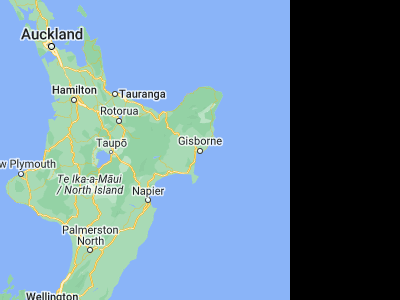When is the best time to go to Gisborne
The chart above shows the best time of year to visit Gisborne, New Zealand. These are based on an analysis of weather averages such as temperature, rainfall and number of hours of sunshine. These ratings are based solely on the climate and do not take into account other factors such as accommodation prices and how busy it is likely to be.
Average temperatures in Gisborne
Gisborne weather by month
Please note our recommendations for when to visit Gisborne are based solely on the weather and do not take into accounts accommodation prices, how busy it will be and what events are on.
January
| Temp | Rain | Sunshine | Day length |
|---|---|---|---|
| 22°C | 76mm | 8.2hrs | 15.5hrs |
Gisborne's weather in January is typically warm and reasonably dry in nature.
It is perhaps the perfect month to visit Gisborne, with some extremely good weather at this time of year.
January is in the summer in Gisborne and is typically the coldest month of the year. Daytime maximum temperatures average around 24°C (76°F), whilst at night 13°C (55°F) is normal.
On average January is the driest month of the year in Gisborne with around 76mm 3 inches of rain making it a reasonably dry time to visit. This rainfall is typically spread over 8 days, although this may vary considerably.
On the flip side this corresponds to an average of 8.2 hours of sunshine per day.
February
| Temp | Rain | Sunshine | Day length |
|---|---|---|---|
| 21°C | 85mm | 7.6hrs | 14.5hrs |
February in Gisborne is generally a little damp with the temperature being warm.
It is perhaps the perfect month to visit Gisborne, with some very good weather at this time of year.
February is in the summer in Gisborne and is typically the 2nd coldest month of the year. Daytime maximum temperatures average around 24°C (75°F), whilst at night 13°C (55°F) is normal.
On average February is the 2nd driest month of the year in Gisborne with around 85mm 3.3 inches of rain making it a a little damp time to visit. This rainfall is typically spread over 10 days, although this may vary considerably.
On the flip side this corresponds to an average of 7.6 hours of sunshine per day.
Gisborne weather in February »
March
| Temp | Rain | Sunshine | Day length |
|---|---|---|---|
| 20°C | 125mm | 6.4hrs | 13.3hrs |
The weather in March in Gisborne is characteristically mild and wet.
It is perhaps a good month to visit Gisborne, with some surprisingly good weather at this time of year.
March is in the fall / autumn in Gisborne and is typically the 3rd coldest month of the year. Daytime maximum temperatures average around 22°C (72°F), whilst at night 12°C (53°F) is normal.
On average March is the 3rd driest month of the year in Gisborne with around 125mm 4.9 inches of rain making it a wet time to visit. This rainfall is typically spread over 12 days, although this may vary considerably.
On the flip side this corresponds to an average of 6.4 hours of sunshine per day.
April
| Temp | Rain | Sunshine | Day length |
|---|---|---|---|
| 17°C | 111mm | 5.8hrs | 12hrs |
Gisborne's weather in April is typically mild and damp in nature.
Although outside the main holiday season, there is still plenty of quite acceptable weather around this time of year. This makes it an okay time to visit Gisborne.
April is in the fall / autumn in Gisborne and is typically the 4th coldest month of the year. Daytime maximum temperatures average around 19°C (67°F), whilst at night 9°C (48°F) is normal.
On average April is the 4th driest month of the year in Gisborne with around 111mm 4.4 inches of rain making it a damp time to visit. This rainfall is typically spread over 13 days, although this may vary considerably.
On the flip side this corresponds to an average of 5.8 hours of sunshine per day.
May
| Temp | Rain | Sunshine | Day length |
|---|---|---|---|
| 15°C | 115mm | 5hrs | 11.1hrs |
May is a damp month in Gisborne and the temperature is generally mild.
Although outside the main holiday season, there is still plenty of reasonably acceptable weather around this time of year. This makes it an okay time to visit Gisborne.
May is in the fall / autumn in Gisborne and is typically the 5th coldest month of the year. Daytime maximum temperatures average around a cool 16°C (61°F), whilst at night 7°C (44°F) is normal.
On average May is the 5th driest month of the year in Gisborne with around 115mm 4.5 inches of rain making it a damp time to visit. This rainfall is typically spread over 13 days, although this may vary considerably.
On the flip side this corresponds to an average of 5 hours of sunshine per day.
June
| Temp | Rain | Sunshine | Day length |
|---|---|---|---|
| 12°C | 156mm | 4.3hrs | 15.5hrs |
June in Gisborne is generally wet with the temperature being cool.
Based on weather alone, this is probably a time of year to avoid going to Gisborne for your holidays. The weather is often pretty bad and not conducive to spending time outdoors.
June is in the winter in Gisborne and is typically the 6th coldest month of the year. Daytime maximum temperatures average around a cool 14°C (57°F), whilst at night 5°C (40°F) is normal.
On average June is the 6th driest month of the year in Gisborne with around 156mm 6.1 inches of rain making it a wet time to visit. This rainfall is typically spread over 16 days, although this may vary considerably.
On the flip side this corresponds to an average of 4.3 hours of sunshine per day.
July
| Temp | Rain | Sunshine | Day length |
|---|---|---|---|
| 12°C | 149mm | 4.6hrs | 14.5hrs |
July in Gisborne is generally wet with the temperature being cool.
Based on weather alone, this is probably a time of year to avoid going to Gisborne for your holidays. The weather is often pretty bad and not conducive to spending time outdoors.
July is in the winter in Gisborne and is typically the 6th warmest month of the year. Daytime maximum temperatures average around a cool 13°C (56°F), whilst at night 4°C (39°F) is normal.
On average July is the 6th wettest month of the year in Gisborne with around 149mm 5.9 inches of rain making it a wet time to visit. This rainfall is typically spread over 15 days, although this may vary considerably.
On the flip side this corresponds to an average of 4.6 hours of sunshine per day.
August
| Temp | Rain | Sunshine | Day length |
|---|---|---|---|
| 13°C | 144mm | 4.9hrs | 13.3hrs |
The weather in August in Gisborne is characteristically cool and wet.
Based on weather alone, this is probably a time of year to avoid going to Gisborne for your holidays. The weather is often not a good and not conducive to spending time outdoors.
August is in the winter in Gisborne and is typically the 5th warmest month of the year. Daytime maximum temperatures average around a cool 14°C (57°F), whilst at night 5°C (41°F) is normal.
On average August is the 5th wettest month of the year in Gisborne with around 144mm 5.7 inches of rain making it a wet time to visit. This rainfall is typically spread over 16 days, although this may vary considerably.
On the flip side this corresponds to an average of 4.9 hours of sunshine per day.
September
| Temp | Rain | Sunshine | Day length |
|---|---|---|---|
| 14°C | 113mm | 5.9hrs | 12hrs |
Gisborne's weather in September is typically mild and damp in nature.
Although outside the main holiday season, there is still plenty of pretty acceptable weather around this time of year. This makes it an okay time to visit Gisborne.
September is in the spring in Gisborne and is typically the 4th warmest month of the year. Daytime maximum temperatures average around a cool 16°C (60°F), whilst at night 6°C (43°F) is normal.
On average September is the 4th wettest month of the year in Gisborne with around 113mm 4.5 inches of rain making it a damp time to visit. This rainfall is typically spread over 15 days, although this may vary considerably.
On the flip side this corresponds to an average of 5.9 hours of sunshine per day.
Gisborne weather in September »
October
| Temp | Rain | Sunshine | Day length |
|---|---|---|---|
| 17°C | 78mm | 7hrs | 11.1hrs |
October is a reasonably dry month in Gisborne and the temperature is generally mild.
It is perhaps a good month to visit Gisborne, with some extremely good weather at this time of year.
October is in the spring in Gisborne and is typically the 3rd warmest month of the year. Daytime maximum temperatures average around 18°C (65°F), whilst at night 8°C (46°F) is normal.
On average October is the 3rd wettest month of the year in Gisborne with around 78mm 3.1 inches of rain making it a reasonably dry time to visit. This rainfall is typically spread over 13 days, although this may vary considerably.
On the flip side this corresponds to an average of 7 hours of sunshine per day.
November
| Temp | Rain | Sunshine | Day length |
|---|---|---|---|
| 19°C | 69mm | 7.8hrs | 15.5hrs |
The climate in Gisborne during November can be summarized as mild and reasonably dry.
It is perhaps the perfect month to visit Gisborne, with some particularly good weather at this time of year.
November is in the spring in Gisborne and is typically the 2nd warmest month of the year. Daytime maximum temperatures average around 21°C (69°F), whilst at night 10°C (49°F) is normal.
On average November is the 2nd wettest month of the year in Gisborne with around 69mm 2.7 inches of rain making it a reasonably dry time to visit. This rainfall is typically spread over 11 days, although this may vary considerably.
On the flip side this corresponds to an average of 7.8 hours of sunshine per day.
Gisborne weather in November »
December
| Temp | Rain | Sunshine | Day length |
|---|---|---|---|
| 20°C | 87mm | 7.8hrs | 14.5hrs |
December in Gisborne is generally a little damp with the temperature being mild.
It is perhaps the perfect month to visit Gisborne, with some particularly good weather at this time of year.
December is in the summer in Gisborne and is typically the warmest month of the year. Daytime maximum temperatures average around a comfortable 23°C (73°F), whilst at night 11°C (53°F) is normal.
On average December is the wettest month of the year in Gisborne with around 87mm 3.4 inches of rain making it a a little damp time to visit. This rainfall is typically spread over 10 days, although this may vary considerably.
On the flip side this corresponds to an average of 7.8 hours of sunshine per day.

Other monthly averages
Gisborne weather stats
| Hottest month: | January | 24°C 75.2°F |
|---|---|---|
| Driest month: | November | 69mm 2.7ins |
| Sunniest month: | January | 8.2hrs |
| Coldest month: | July | 12.9°C 55.2°F |
| Wettest month: | June | 156mm 6.1ins |
| Warmest sea: | February | 20.3°C 68.5°F |


Top New Zealand locations
- Abel Tasman National Park
- Auckland
- Christchurch
- Dunedin
- Kaikoura
- Milford Sound
- Napier
- Nelson
- Queenstown
- Rotorua
- Taupo
- Wanaka
- Wellington